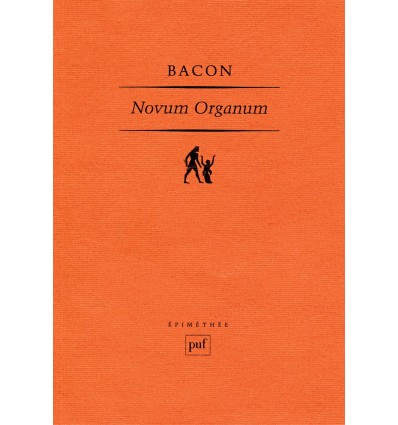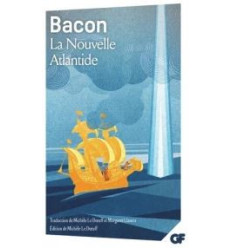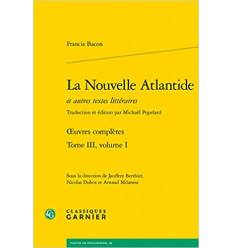Humanism • Spirituality • Well-being
-
0
Product
Products
No products
To be determined
Shipping
0,00 €
Total
Prices are tax included
Product successfully added to your shopping cart
Quantity
Total
There are 0 items in your cart. There is 1 item in your cart.
Total products
(tax incl.)
Total shipping (tax incl.)
To be determined
Novum Organum
The major work of philosopher Francis Bacon, first published in 1620. Novum Organum assigns an essential place to scientific progress and experiment.
3 Items
In stock Delivery 2 to 4 days
Description
Francis Bacon was the author of a proposal to regenerate the sciences: the Novum Organum, probably his most important book and that in which his genius is most evident; certainly the one he laboured most over - it was rewritten twelve times. Bacon conducted research into the nature of things, their substance and their essence. He believed it necessary to adopt an attitude of attentive and patient observation. The book, published for the first time in 1620, contains two volumes. In the first, Bacon shows that neither the Ancients nor the Moderns understood how to develop a method for studying science, making it impossible for them to progress. In the second volume, he undertakes a definition of the necessary method: one must begin by gathering and organizing the facts, for no one should dare to interpret nature before he has conducted scientific experiments. Bacon continues by saying that it is necessary to keep in mind the rule: imagine nothing, suppose nothing, but uncover or find out what nature does and experiences. The resulting regeneration of the sciences, to be conducted by scientists from all over the world exchanging their experiences in a true spirit of brotherhood, should be a source of happiness and prosperity for humanity. This text, alternately celebrated and scorned, but never widely read, is presented here in its second translation into French, after that of Lasalle.
Characteristics
| Author | FRANCIS BACON | |
| Editor | PUF | |
| Number of pages | 349 | |
| Type of book | Broché | |
| Language | French | |
| Dimensions | 15 x 21,5 |
Bacon Francis
-
Books
- Western traditions
-
Western mystical authors
- Bacon Francis
- Boehme Jacob
- Bruno Giordano
- Davy Marie-Madeleine
- Desjardins Arnaud
- Dürckheim Karlfried Graf
- Eckartshausen Karl von
- Lévi Eliphas
- Maier Michael
- Maître Philippe
- Mystiques chrétiens
- Papus
- Paracelse
- Pic de la Mirandole Jean
- Saint-Yves d'Alveydre Alexandre
- Schwaller de Lubicz René Adolphe et Isha
- Sédir
- Souzenelle Annick de
- Steiner Rudolf
- Swedenborg Emmanuel
- Teilhard de Chardin, Pierre
- Vinci Léonard de
- Oriental traditions
- Oriental mystical authors
- Other traditions
- Religions
- Symbolism - Wisdom- Spiritual practices
- Philosophy- Utopias
- Prayer - Meditation- Visualisation
- Science and spirituality
- Gift books
- Arts divers (Peinture - Sculpture - Architecture - Danse ...)
- Music
- Novels - Tales - Poems
- Biographies
- Audiobooks
- Health
- Psychology
- Inner fulfilment
- Children' s books
- Death - NDE - Palliative care (support to the terminally-ill)
- Reincarnation - Karma
- Ecology - Nature
- Feng Shui - Geobiology
- Tarots - Pendulums
- Foreign mystical literature
- Coffee-table books
- Rosicrucian books
- Martinist books
- Incense
- Ritual objects
- Music
- Health and well-being
-
Gift Ideas
- Traditional objects
- L'esprit de la Chevalerie &
- Nature
- Terrestrial, celestial, and planetary globes
- Le plaisir d'écrire
- Postcards - Stationery
- Candles - Candle holders - Candle snuffers
- Parfums d'intérieur
- Jewellery
- Home and garden decoration
- Children
- Divinatory arts
-
Noël 2025
- Hildegarde de Bingen
- Lumières du Moyen Âge
- L'esprit de la Chevalerie
- La quête de la Lumière
- Beaux-Livres
- Le plaisir de lire
- La méditation
- Le jardin secret
- Les murmures de la nature
- La langue des oiseaux
- Beauté de l'univers
- L'âme de la rose
- Encens rosicrucien
- Encens divers
- Rêves d'Orient
- L'Égypte, terre de Tradition
- Le monde des senteurs
- Bijoux
- L'enfance
- Noël
- Cartes de fin d'année
- Rosicrucian and Martinist items
from 95€
change your mind
payment










Follow us